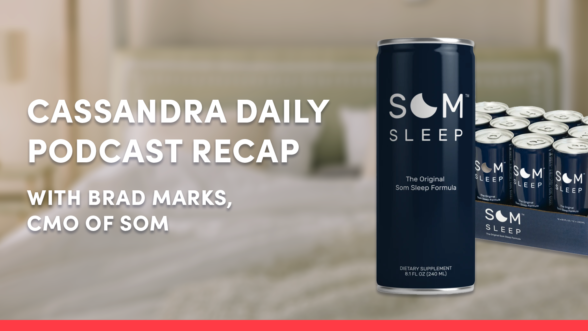DRINK (SOM)E OF THIS
Recapping the Cassandra Daily podcast with Som
In the Cassandra Burnout report, we found that 9 in 10 U.S. Trendsetters agree everybody gets burnt out at some point. In order to combat this, 73% of US Trendsetters and over half of US Millennials and Gen Zs overall say they prioritize sleep to maintain their physical health. That’s where Som comes in. In preparation for the start of Day Light Savings this Sunday, we are revisiting some of the findings that the CMO of Som Sleep shared with us in a recent podcast. Som is a sleep drink that's engineered to help consumers fall asleep faster and sleep better throughout the night. Read below to learn all about the beverage, why sleep hygiene is absolutely essential, and explore some Cassandra research around health and sleep that further supports Som's market positioning.

Q&A
What’s the intro to the Som brand?
Som is an 8 oz. sleep drink, we’re the opposite of an energy drink. You drink it 30 minutes before you go to bed and it helps you fall asleep and stay asleep. I think the best benefit of the product is that it’s drug-free, non-habit forming, non-GMO, non-everything, basically. It’s something we developed for our own needs, there was a deficiency in the market. We’re coming on three years of being in business and it’s become my daily routine.
What can you share with us about consumers and sleep hygiene?
Sleep hygiene is real, it’s important. We preach it and follow it every day. For people who don’t understand what it is: it’s really getting yourself and your body and your environment in a position to go to sleep. Examples are: make sure the temperature in your room is right, make sure your sheets aren’t too hot or too cold, turn the lights off before you go to bed, turn off your phone, your tv, don’t watch tv in bed. All these things are crucial to getting a quality night’s sleep.
It’s an interesting thing because you can follow all the sleep hygiene rules and there are times where you followed everything and you lay in bed and stare at the ceiling saying “I’m tired, but I can’t fall asleep.” And it happens to a lot of us, and there’s a lot of different reasons behind that. Mainly, it’s that we are nutrient deficient before we go to bed. That’s were Som Sleep comes in, it’s a tool to really get your body back to baseline, or even above and allowing your body to fall asleep the natural way.
Cassandra found that 82% of US Trendsetters and 70% of US Millennials and Gen Zs overall agree that in the future all, brands will need to be considerate of health and wealth for survival. How can Som relate to this in terms of mental health and its product portfolio?
It works hand in hand with mental health. Dr. Jerry Spencer, who’s a world-renowned sports psychologist, who is a good friend, states that a lack of sleep causes mental health issues. If you really break down our society, with social media, with video games, all these different things that are stress inducing and causing us not to sleep, they’re all relatively new to society and only getting stronger as we grow as a technology-based country. If you think about our parents, grandparents, great-grandparents, there were sleep issues but not like they are today. These mental health issues are not the same as they once were. If you deconstruct where that’s coming from, lack of sleep is a major cause of mental health issues.
How have you seen sleep repositioned in terms of physical health?
It used to be a badge of honor to say ‘I pulled an all-nighter’ but if you say that today, people look at you sideways, like “what’s wrong with you?” Elon Musk said he sleeps 2-3 hours a night and sometimes sleeps under a desk at Tesla, and people came out and slammed him, like “be an effective leader.” I think as a society it’s not a question mark anymore, we know how sleep affects us from a physical and a cognitive stance. When it comes to educating consumers, I feel like we’re at a point now where sleep is at the forefront and has been for a few years.
In our 2021 Outlook report, Cassandra identified that Millennials and Gen Zs will embrace intentional living and self-care, especially in terms of mental and physical health. Where do you see the concept of self-care going in the future?
I think we’ve had a lot of time to reflect in 2020. You can see it online, so many people are working out, we turned our houses into our home gyms, I think as a society we’re eating better. We know that a healthy diet and sleep will drastically increase your chances of preventing viruses, including COVID-19. Before, it might’ve been a choice, like “ah, if I get sick so what?” Now it’s almost life or death. I think, as a society, we knew it was important, now it’s imperative. It’s a must. This is not an option, this is a requirement—to take our health care seriously.